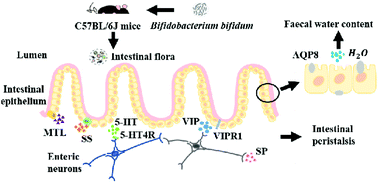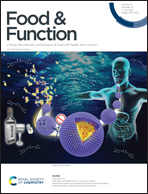Different Bifidobacterium bifidum strains change the intestinal flora composition of mice via different mechanisms to alleviate loperamide-induced constipation
Abstract
Constipation is a condition with a high prevalence rate worldwide and may occur in men and women of any age. Bifidobacterium bifidum has been shown to have a relieving effect on constipation, but the underlying mechanism is still unknown. This study explored the effects of gavage of three strains of B. bifidum (CCFM668, FHNFQ25M12 and FXJCJ32M2) from different sources in mice with loperamide-induced constipation. After 38 days of intervention, B. bifidum CCFM668, FHNFQ25M12 and FXJCJ32M2 showed the ability to modify the levels of gastrointestinal active peptides and promote the expression of 5-hydroxytryptamine (5-HT or serotonin) receptor 4 (5-HT4R), thereby promoting small intestinal peristalsis. The strains could also effectively increase the thickness of the colonic mucosa. However, what was different from previous studies was that these results were independent of the levels of short-chain fatty acids (SCFAs) and 5-HT. Further analysis of the intestinal flora revealed that the relative abundances of the genera Faecalibaculum and Ruminococcaceae_UCG_014 in the constipated mice increased significantly, whereas that of Erysipelatoclostridium decreased. A correlation analysis between the intestinal flora and evaluated gastrointestinal indicators demonstrated that the relative abundances of the genera Anaerotruncus, Angelakisella, Erysipelatoclostridium and Ruminococcaceae_UCG_014 were negatively correlated with the levels of gastrointestinal active peptides. B. bifidum FXJCJ32M2 can increase the relative abundances of Turicibacter and Dubosiella, and this was positively correlated with the expression of aquaporin 8 and vasoactive intestinal peptide receptor 1 but could not effectively alleviate faecal dryness or promote colonic motility. These findings suggest that B. bifidum shows significant intraspecific differences in the remission mechanism and provides a theoretical basis for subsequent population experiments and personalised treatment for constipation.



 Please wait while we load your content...
Please wait while we load your content...